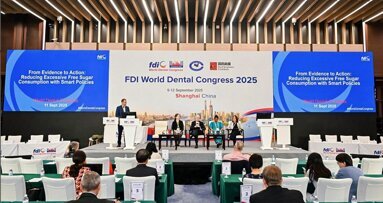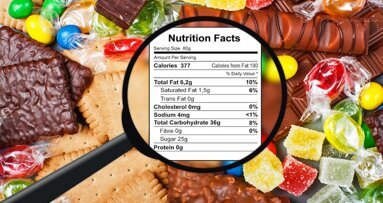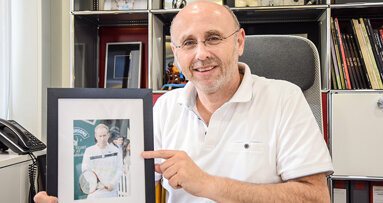RUGBY, UK: Though the April 2018 introduction of the Soft Drinks Industry Levy—otherwise known as the sugar tax—has proved effective in reducing the sugar levels of many carbonated beverages, UK adults and children continue to consume far more of this sweet substance than is generally recommended. The Oral Health Foundation (OHF), a charity that seeks to reduce the burden of oral disease and improve well-being, has found that the British population supports further taxation of high-sugar foods in the form of a “pudding tax”.
The OHF recently conducted a nationwide poll in which 54% of the respondents affirmed their support for an extension of the sugar tax to puddings, cakes, biscuits and other confectionary foods. The proposed tax proved to be particularly resonant among those less than 35 years of age, with 84% of this demographic group agreeing that a pudding tax should be effected.
“The sugar tax has been a significant success, not only for oral health, but wider health and well-being too. In the long term, products with less added sugar will mean a healthier population. It will also save the NHS billions every year,” said Dr Nigel Carter, OBE, Chief Executive of the OHF.
“When it comes to sugar, 10% of a child’s intake comes from soft drinks, but more than twice that comes from puddings, ice cream and sweets. It means that replicating the model into a pudding tax is absolutely necessary,” Carter added.
The findings come on the back of the results of another survey from the OHF, which found that 28% of British adults consume high-sugar or otherwise unhealthy foods when put under stress, a figure that rose to 32% for office workers. In addition, 15% of the respondents stated that they had taken sick leave in the past two years as a direct result of an oral health problem.
“It is important to encourage healthy eating and to develop a more tooth-friendly culture in the workplace,” said Carter. “Snacks such as cheese and nuts are better than sugary treats. Milk and water is a great substitute for juices and fizzy drinks, while reducing the amount of sugar added to tea and coffee can make a big difference. By helping employees look after their oral health, the workforce will not only be healthier, they will be happier too.”
Tags:
MELBOURNE, Australia: A major contributor to quality oral health is awareness and education. With this in mind, the Australian Dental Association (ADA) has ...
DURBAN, South Africa: As the number of reported cases of children with autism spectrum disorder (ASD) continues to climb across the globe, the special ...
In light of rising rates of chronic disease and growing awareness of the health risks associated with excessive sugar consumption, governments around the ...
LONDON, England: While chewing gum may be considered a somewhat undesirable habit, sugar-free varieties have been proved to be highly beneficial for oral ...
LEIPZIG, Germany: The global obesity epidemic shows few signs of abating, and numerous countries from different regions have introduced policies aimed at ...
LONDON, UK: With Britain still recovering from its longest heatwave in five years, parents may be tempted to help keep their children cool by giving them ...
HALLE, Germany: According to a joint study conducted by researchers at the Martin Luther University Halle-Wittenberg (MLU) and the Biotechnology Research ...
WELLINGTON, New Zealand: Increased intake of sugar‐sweetened beverages (SSBs) is associated with a higher risk of Type 2 diabetes, cardiovascular disease,...
Sports dentistry is usually considered only to deal with sports injuries and accidents. Naturally, a dental trauma that includes fractures of teeth and ...
CANBERRA, Australia: The poor state of Australians’ oral health has received much needed attention over recent years. For some Aboriginal and Torres ...
Live webinar
Tue. 24 February 2026
1:00 pm EST (New York)
Prof. Dr. Markus B. Hürzeler
Live webinar
Tue. 24 February 2026
3:00 pm EST (New York)
Prof. Dr. Marcel A. Wainwright DDS, PhD
Live webinar
Wed. 25 February 2026
11:00 am EST (New York)
Prof. Dr. Daniel Edelhoff
Live webinar
Wed. 25 February 2026
1:00 pm EST (New York)
Live webinar
Wed. 25 February 2026
8:00 pm EST (New York)
Live webinar
Tue. 3 March 2026
11:00 am EST (New York)
Dr. Omar Lugo Cirujano Maxilofacial
Live webinar
Tue. 3 March 2026
8:00 pm EST (New York)
Dr. Vasiliki Maseli DDS, MS, EdM



 Austria / Österreich
Austria / Österreich
 Bosnia and Herzegovina / Босна и Херцеговина
Bosnia and Herzegovina / Босна и Херцеговина
 Bulgaria / България
Bulgaria / България
 Croatia / Hrvatska
Croatia / Hrvatska
 Czech Republic & Slovakia / Česká republika & Slovensko
Czech Republic & Slovakia / Česká republika & Slovensko
 France / France
France / France
 Germany / Deutschland
Germany / Deutschland
 Greece / ΕΛΛΑΔΑ
Greece / ΕΛΛΑΔΑ
 Hungary / Hungary
Hungary / Hungary
 Italy / Italia
Italy / Italia
 Netherlands / Nederland
Netherlands / Nederland
 Nordic / Nordic
Nordic / Nordic
 Poland / Polska
Poland / Polska
 Portugal / Portugal
Portugal / Portugal
 Romania & Moldova / România & Moldova
Romania & Moldova / România & Moldova
 Slovenia / Slovenija
Slovenia / Slovenija
 Serbia & Montenegro / Србија и Црна Гора
Serbia & Montenegro / Србија и Црна Гора
 Spain / España
Spain / España
 Switzerland / Schweiz
Switzerland / Schweiz
 Turkey / Türkiye
Turkey / Türkiye
 UK & Ireland / UK & Ireland
UK & Ireland / UK & Ireland
 Brazil / Brasil
Brazil / Brasil
 Canada / Canada
Canada / Canada
 Latin America / Latinoamérica
Latin America / Latinoamérica
 USA / USA
USA / USA
 China / 中国
China / 中国
 India / भारत गणराज्य
India / भारत गणराज्य
 Pakistan / Pākistān
Pakistan / Pākistān
 Vietnam / Việt Nam
Vietnam / Việt Nam
 ASEAN / ASEAN
ASEAN / ASEAN
 Israel / מְדִינַת יִשְׂרָאֵל
Israel / מְדִינַת יִשְׂרָאֵל
 Algeria, Morocco & Tunisia / الجزائر والمغرب وتونس
Algeria, Morocco & Tunisia / الجزائر والمغرب وتونس
 Middle East / Middle East
Middle East / Middle East












































To post a reply please login or register